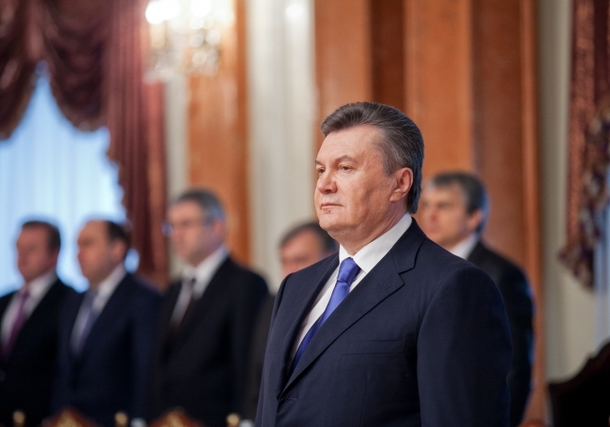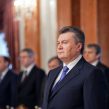
Ukraine Sliding From Oligarchy to Cronyism
Publication: Eurasia Daily Monitor Volume: 10 Issue: 8
By:

The recent appointment of a second government led by Prime Minister Nikolai Azarov confirms Ukraine’s evolution from an oligarchy to a cronyist state whereby positions of power are increasingly being accorded to “the Family,” composed of President Viktor Yanukovych’s close relatives and loyal associates from his home town of Yenakiyeve in Donetsk oblast (see EDM, December 2, 2011). “The Family” is orchestrated by the president’s eldest son, Oleksandr (https://www.pravda.com.ua/articles/2012/12/25/6980434/).
Azarov is not a “Family” member and heads a caretaker government. However, twelve positions have been allocated to “The Family,” facilitating the privatization of the state budget and security forces. Illustratively, former National Bank of Ukraine (NBU) Chairman Serhiy Arbuzov was made first deputy prime minister, a position from which he is likely to rise to prime minister. The new NBU Chairman Ihor Sorkin was born in Donetsk and in 2002–2010 headed the Donetsk branch of NBU.
Sorkin’s wife, Angela, is the deputy head of UkrBiznesBank, now owned by Oleksandr Yanukovych but headed by Arbuzov until 2010. Both Angela Arbuzov and Oleksandr Yanukovych are (bizarrely) dentists by profession, and Oleksandr entered Ukraine’s top 100 wealthiest people in 2011, a year after his father came to power. Ihor Sorkin’s parents live in Moscow and his father is employed by a Gazprom entity whose affiliate in Donetsk employs Ihor’s sister (https://www.pravda.com.ua/articles/2013/01/11/6981269/).
The State Tax Administration and Customs Service have been merged and, under the new government, continue to be headed by “Family” member Oleksandr Klimenko. “The Family” also continues to control the interior ministry (Vitaliy Zakharchenko) and the Ministry of Agriculture (Mykola Prysyazhniuk). Arbuzov and Prysyazhniuk will steer the last big privatization wave in Ukraine, this time of land (Gorshenin Weekly, December 24, 2012).
Rukh party defector Oleksandr Lavrynovych for now remains minister of justice and is slated to be Chairman of the Central Election Commission, but Batkivshchina defector Andriy Portnov will succeed him as justice minister. Portnov had provided legal counsel to Tymoshenko who challenged Yanukovych’s 2010 election. Two opposition defectors would be therefore in place to ‘manage’ the re-election of Yanukovych in 2015.
Dmytro Tabachnyk, loathed by the opposition for his inflammatory remarks about Western Ukrainians and Ukrainian history, remains minister of education and was lobbied in 2010 by the Russian Orthodox Patriarch. The tradition since 2010 of ex-Russian citizens who served in the Russian armed forces controlling the security forces continues with Minister of Defense Pavlo Lebedyev and Oleksandr Yakymenko, made first deputy chief of the SBU by Yanukovych last year (Kyiv Post, July 6, 2012; https://tvi.ua/new/sekretna_perepyska_hlavy_sbu).
The oligarchic gas lobby has lost influence in the new government, having been unable to secure many parliamentary seats in the October 2012 elections within the Party of Regions (see EDM, March 18, 2010; March 6, 2012; May 15, 2012). As an insurance policy and to support the non-Tymoshenko opposition, the gas lobby invested in Vitaliy Klychko’s Ukrainian Democratic Alliance for Reforms part (UDAR).
In the new government, Leonid Kozhara replaced Kostyantyn Gryshchenko as foreign minister (the former is aligned with oligarch Rinat Akhmetov’s group and the latter with the gas lobby). Gryshchenko’s replacement was part of a PR campaign claiming the “pro-Russian” gas lobby had derailed Ukraine’s European integration.
Akhmetov controls transportation, economy, social and regional policy in the government and holds strong influence over Minister of Economic Development and Trade Ihor Prasolov, the former first deputy head of Akhmetov’s business empire Systems Capital Management (SCM). Akhmetov’s man in Dnipropetrovsk, former governor Oleksandr Vulkov, facilitated the expansion of SCM into that oblast. Vulkov was appointed Deputy Prime Minister where he will work alongside another loyalist, First Deputy Prime Minister Borys Kolesnykov.
Gas lobby member Yuriy Boyko was moved from being minister of energy and the coal industry to first deputy prime minister where he could be marginalized. Whereas, in November 2012, First Deputy Prime Minister Valeriy Khoroshkovsky resigned, as he claimed, due to the absence of economic reforms and the freezing of Ukraine’s European integration. Yet, Khoroshkovsky’s European integration credentials are suspect since, notably, in 2010–2012 as chairman of the Security Service (SBU) he revived KGB-style policies against the opposition (https://zn.ua/POLITICS/evrointegratsiya_uskorit_nelzya_medlit-113464.html). Nevertheless, the departure of Khoroshkovsky, Serhiy Tihipko and former Our Ukraine businessman Petro Poroshenko means there is no longer even a moderate pro-European influence within the Azarov government.
The chameleon nature of Ukrainian politicians such as Khoroshkovsky and Akhmetov represents a conundrum for Western policymakers who wrongly accept at face value what these Ukrainian politicians tell them—which, more often than not, is what Westerners wish to hear (EDM, April 17, 2012). In reality, in the past both oligarchs have prioritized short term graft over medium-to-long-term objectives of European integration.
The increasing cronyism and privatization of the budget and security forces by “the Family” portends deepening corruption and political instability over the coming year in Ukraine. Taken together, the new-old Azarov government will not be able to undertake needed reforms, sign a new agreement with the International Monetary Fund or unfreeze Ukraine’s relations with the European Union.




